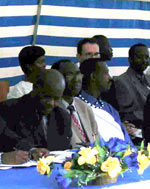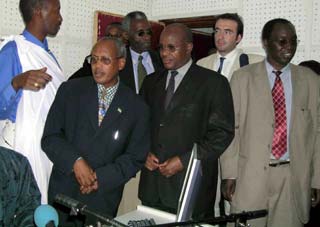UNESCO supported campus radio in Rwanda ranks third most popular station
06-11-2006 (Paris/Kigali)

Inauguration ceremony of the
radio station, 18 November 2005
© UNESCO
Radio Salus, a UNESCO supported radio station at the National University of Rwanda, is after just nine months since its inauguration the third most listened station in the country, according to a recent study by La Benevolencija - Humanitarian Tools Foundation.
The station has also been rated the top sports programming radio by the Rwanda Football Federation and has engaged in an innovative ‘communication for development’ partnership with local coffee-growers associations.
«The management, journalists and listeners are very proud of the station and of these achievements», said Aldo Havugimana, Radio Salus’ managing editor, commenting the news.
Radio Salus was the first university/community radio station established in Rwanda. Based in the Southern town of Butare, which hosts the National University of Rwanda (NUR), the station was officially inaugurated on 18 November 2005 thanks to a UNESCO implemented project funded by the European Commission.
Radio Salus is now on air 18 hours a day, broadcasting primarily in the Kinyarwanda language, but also in Kiswahili, English and French. Its programmes range from educational ones to current affairs and entertainment. Radio Salus covers most of South Rwanda and soon a second transmitter is to be installed in Kigali, which will allow the station to reach the entire country by its first anniversary in November 2006.
Since its inception, Radio Salus has been engaged in several partnerships with other stations in the Great Lakes Region, as well as with institutions and NGOs. Radio Salus has established a cooperation with a fair-trade project implemented by the NUR’s Faculty of Agronomy with the Maraba Coffe Growers’ association broadcasting a weekly programme targeting coffee growers in South Rwanda, and providing key information to improve the quality of their productions and to optimize the conditions for selling their products.
UNESCO has been organizing in-house training sessions that take place on a regular basis and are funded by Japan, under the supervision of facilitator Michelle Betz. A 20- day follow-up training course has just been completed strengthening the programming and production editing techniques of Radio Salus’ staff and trainees.
Radio Salus is integrating its radio programming with the School of Journalism’s curriculum of the NUR, both as a pedagogical tool for the students, and as a strategy to achieve self-sustainability in the long term thanks to the students’ voluntary work. The editorial independence of Radio Salus is guaranteed by a Council of Advisers chaired by NUR’s Rector and composed of three other members from the academic Senate including the dean of the School of Journalism and Communication, two representatives from students’ associations, one representative from the Ministry of Information and three members representing both the local urban and rural communities.
«The management, journalists and listeners are very proud of the station and of these achievements», said Aldo Havugimana, Radio Salus’ managing editor, commenting the news.
Radio Salus was the first university/community radio station established in Rwanda. Based in the Southern town of Butare, which hosts the National University of Rwanda (NUR), the station was officially inaugurated on 18 November 2005 thanks to a UNESCO implemented project funded by the European Commission.
Radio Salus is now on air 18 hours a day, broadcasting primarily in the Kinyarwanda language, but also in Kiswahili, English and French. Its programmes range from educational ones to current affairs and entertainment. Radio Salus covers most of South Rwanda and soon a second transmitter is to be installed in Kigali, which will allow the station to reach the entire country by its first anniversary in November 2006.
Since its inception, Radio Salus has been engaged in several partnerships with other stations in the Great Lakes Region, as well as with institutions and NGOs. Radio Salus has established a cooperation with a fair-trade project implemented by the NUR’s Faculty of Agronomy with the Maraba Coffe Growers’ association broadcasting a weekly programme targeting coffee growers in South Rwanda, and providing key information to improve the quality of their productions and to optimize the conditions for selling their products.
UNESCO has been organizing in-house training sessions that take place on a regular basis and are funded by Japan, under the supervision of facilitator Michelle Betz. A 20- day follow-up training course has just been completed strengthening the programming and production editing techniques of Radio Salus’ staff and trainees.
Radio Salus is integrating its radio programming with the School of Journalism’s curriculum of the NUR, both as a pedagogical tool for the students, and as a strategy to achieve self-sustainability in the long term thanks to the students’ voluntary work. The editorial independence of Radio Salus is guaranteed by a Council of Advisers chaired by NUR’s Rector and composed of three other members from the academic Senate including the dean of the School of Journalism and Communication, two representatives from students’ associations, one representative from the Ministry of Information and three members representing both the local urban and rural communities.
 First broadcast of Radio Salus
First broadcast of Radio Salus© UNESCO
Related themes/countries
· Capacity Building: News Archives 2006
· Freedom of Expression: News Archives 2006
· Community Media: News Archives 2006
· Media Development: News Archives 2006
· Media in Conflict and Post-Conflict Situations: News Archives 2006
· Rwanda: News Archives 2006
Share this story:














